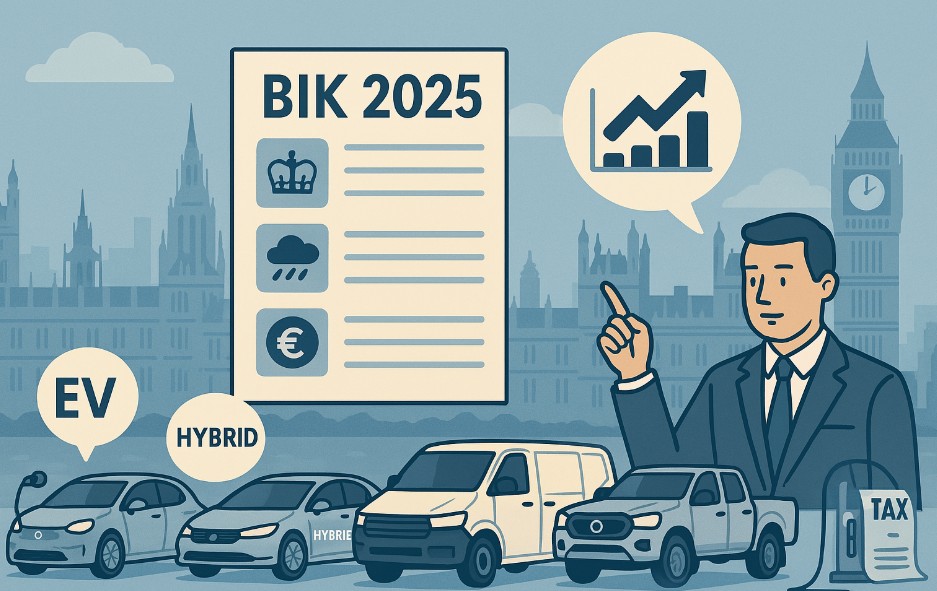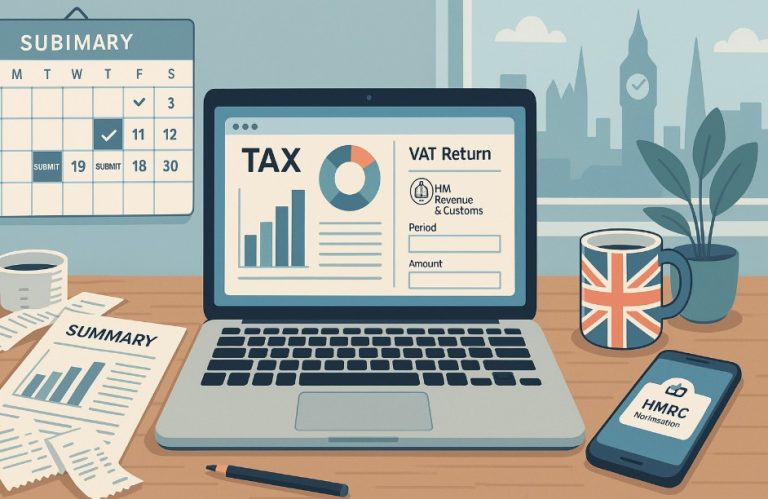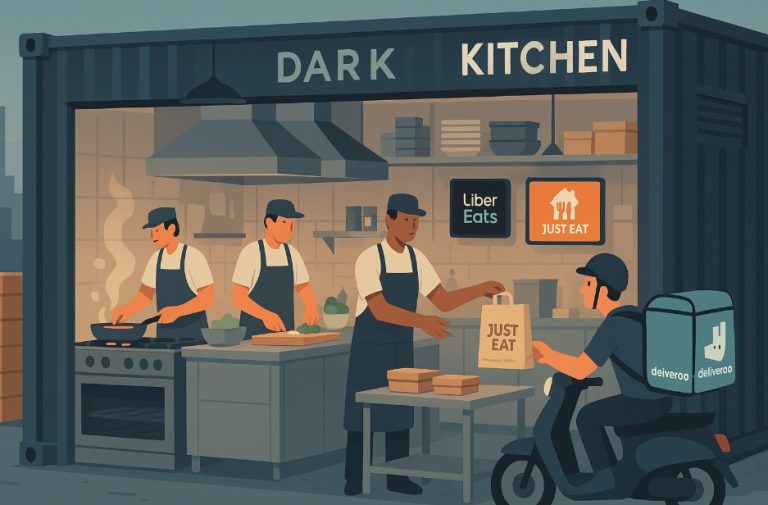Rachel Reeves BIK Tax Changes: What Every UK Startup Should Know Now?
What does a tax change mean for over 760,000 company car drivers in the UK, especially those working in startups?
From 6 April 2025, the UK entered a new era of vehicle benefit taxation. Chancellor Rachel Reeves’ revised Benefit-in-Kind (BIK) policy is now in full effect, ushering in sweeping changes that will affect not only how cars are taxed but also how businesses design employee benefits.
The policy introduces a five-year roadmap of tax increases for electric vehicles, hybrids, petrol and diesel models, alongside a controversial reclassification of double cab pickups.
Startups and SMEs already navigating complex payroll, compliance, and recruitment demands must now re-evaluate how vehicle perks fit into their financial strategy.
With new BIK thresholds, shifting compliance rules, and employer National Insurance contributions on the rise, the implications are wide-ranging.
This guide breaks down what’s changed, who is impacted, and what UK startups can do right now to stay compliant, cost-efficient, and competitive.
What Are BIK (Benefit in Kind) Taxes?

Benefit in Kind (BIK) taxes are imposed on non-cash benefits that employers provide to employees in addition to their regular salary.
These benefits can include company cars, private health insurance, accommodation, or even gym memberships. Although not direct salary, these benefits hold a monetary value and are therefore taxable under UK law.
In particular, the BIK tax applies to vehicles provided by employers for personal use. HMRC calculates BIK on vehicles using various factors:
- The list price of the vehicle (P11D value)
- CO₂ emissions
- Fuel type (petrol, diesel, electric, or hybrid)
- The vehicle’s registration date
For UK startups and small businesses, offering company vehicles can be a practical incentive to attract talent, especially in sectors where travel is essential. However, these incentives carry tax obligations that affect both the employer’s financial outgoings and the employee’s net salary.
Why Do BIK Taxes Matter for UK Startups?
In the 2025/26 tax year, the relevance of BIK taxes has become more pronounced than ever. On 6 April 2025, new BIK tax rates officially came into force following policy changes introduced by Chancellor Rachel Reeves.
More than 760,000 UK employees currently use company cars. Many of these individuals, along with the businesses that employ them, will be directly affected by this shift. Startups, in particular, need to be proactive.
Unlike larger corporations, they often have limited financial and HR resources to absorb sudden cost increases or navigate complex tax code changes.
BIK taxes can significantly affect payroll strategy, recruitment incentives, employee satisfaction, and even the company’s approach to sustainability.
The latest changes go beyond routine fiscal adjustments and represent a major policy shift designed to influence business behaviour, specifically around emissions, vehicle use, and sustainability.
What Are the Key Highlights of Rachel Reeves’ BIK Tax Changes in 2025?

The BIK reforms introduced by Rachel Reeves aim to make the tax system more environmentally conscious and fiscally balanced.
At the core of the changes are revised BIK rates that affect electric vehicles (EVs), hybrids, and high-emission vehicles differently.
These are the main highlights of the new BIK policy:
- BIK tax rates for electric vehicles will gradually rise from 2% to 9% over the next five years.
- Hybrid vehicles, once seen as tax-efficient, will now face significantly higher rates starting in 2028.
- Petrol and diesel vehicles will see incremental tax increases based on their CO₂ emissions.
- A new classification system for double cab pickups means many will no longer qualify as vans but as cars resulting in higher taxes.
- Employer National Insurance contributions are expected to rise in line with higher BIK values.
The changes are part of a broader Labour initiative to align taxation with climate policy while increasing long-term predictability for businesses and the automotive sector.
How Will Rachel Reeves’ Tax Policy Impact Startups and Small Businesses?
For startups that rely on company cars as part of their benefits offering or operational strategy, the implications are significant.
The gradual increase in electric vehicle BIK rates means that while EVs remain the most tax-efficient option, they are no longer as inexpensive as they once were.
On the other hand, hybrid vehicles, which offered a middle-ground solution, will become considerably less attractive from a tax perspective by 2028.
Vehicles with emissions between 1–50g/km CO₂ will be subject to BIK rates as high as 19%, removing much of the fiscal appeal they previously held.
Petrol and diesel vehicles will continue to face even steeper penalties. BIK rates will rise each year based on the CO₂ output of the vehicle, with high-emission models seeing rates increase from 37% to 39% by 2029.
The following table outlines the government’s five-year plan for BIK taxation by vehicle type:
BIK Rate Progression: 2025–2030
| Vehicle Type | 2024/25 | 2025/26 | 2026/27 | 2027/28 | 2028/29 | 2029/30 |
| Electric Vehicles (EVs) | 2% | 3% | 4% | 5% | 7% | 9% |
| Hybrids (1–50g/km CO₂) | 5–17% | No change | No change | No change | 18% | 19% |
| Petrol/Diesel (51–54g/km) | ~25% | ~25% | ~25% | ~25% | 19% | 20% |
| High Emission (160g/km+) | 37% | 37% | 37% | 37% | 38% | 39% |
For employers, the rising BIK rates translate into higher employer National Insurance contributions, increasing the overall cost of offering company cars.
These changes may prompt startups to revisit their fleet policies and consider more tax-efficient forms of employee benefits.
What Will Be the Sector-Specific Effects of the BIK Tax Changes?
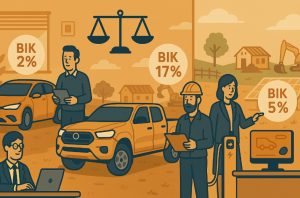
The updated BIK tax policy will have differing effects depending on the industry and nature of vehicle use. For example:
Technology Startups
These companies often provide high-end gadgets and tech-focused benefits. If company cars are part of the perk package, startups may need to shift towards leasing EVs to retain cost advantages.
Construction and Trade
Double cab pickups are widely used across this sector and were previously classified as vans. Under the new policy, many will be reclassified as cars and taxed based on emissions, which could add up to £15,000 in extra tax per vehicle annually.
Green Energy and Sustainability Startups
These businesses will find the policy aligns with their values. However, as EV tax rates increase, they will still need to plan for long-term budget changes.
How Do the Old and New BIK Tax Frameworks Compare?
Understanding how the new policy compares with the old one is essential for strategic planning. The table below compares BIK rates under the old framework versus the upcoming structure.
Comparative Table: Old vs New BIK Tax Policy
| Vehicle Type | Previous BIK Rate Range | New BIK Rate (2025–30) |
| Electric Vehicles (EVs) | 0–2% | 3% to 9% (gradual yearly increase) |
| Hybrids (1–50g/km) | 5–17% (based on electric range) | 18–19% (flat rate regardless of range) |
| Petrol/Diesel (low CO₂) | 25–28% | 19–20% by 2029 |
| High-Emission Vehicles | 37% | Up to 39% by 2029 |
The clear trend is a diminishing incentive for hybrids and an aggressive push toward full electric vehicle adoption.
What Are the HMRC Compliance and Reporting Requirements Under the New BIK Rules?
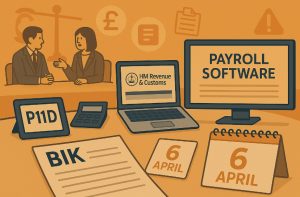
As BIK values increase, so does the importance of accurate reporting. Employers must ensure they meet all HMRC compliance guidelines:
- Complete and submit P11D forms annually for each employee receiving a benefit.
- Reflect new BIK values accurately in payroll systems.
- Factor in increased employer National Insurance contributions.
- Use accounting software that supports real-time reporting and BIK calculations.
For startups managing their own accounting in-house, it may be necessary to seek external advice or adopt cloud-based software like Sage, QuickBooks, or Xero.
What Strategic Moves Can Startups Make to Stay Tax-Efficient in 2025?
A reactive approach could prove costly. Startups should take preemptive steps to adapt to the evolving BIK landscape.
Conduct a Fleet Audit
- Start by evaluating the current fleet. Identify emissions levels, vehicle types, and lease dates.
Shift to Electric or Low-Emission Vehicles
- Given the still relatively low BIK rates for EVs, moving toward electric options remains a tax-efficient choice.
Review Salary Sacrifice Schemes
- These schemes still offer savings when aligned with EV leases. Repackage employee benefit structures to promote their use.
Explore Alternative Transport Benefits
- In urban areas, public transport subsidies or bike-to-work schemes could serve as low-cost alternatives to company cars.
What Are Industry Experts Saying About the New BIK Tax Changes?

Experts are closely monitoring the policy’s impact across sectors. While many acknowledge the environmental benefits, the financial implications for businesses are harder to ignore.
Financial analysts have noted that the reclassification of double-cab pickups could disproportionately impact rural and trade-based businesses.
These sectors, reliant on vehicles that were once considered vans, now face high BIK rates and related employer taxes.
HR professionals have also stressed the need for early communication with employees regarding how their vehicle benefits may change. Updating contracts and offering alternative perks can help mitigate dissatisfaction.
How Can UK Startups Navigate Rachel Reeves’ BIK Tax Changes with Confidence?
Startups should take the following immediate actions:
- Review current vehicle use and lease agreements
- Replace petrol and diesel vehicle orders with EVs before April 2025 to benefit from transition rules
- Communicate changes clearly to employees
- Seek professional tax guidance to avoid costly misreporting or missed incentives
Conclusion
The Rachel Reeves BIK tax changes represent a significant shift in how company vehicles are treated under UK tax law.
While the reforms are designed to support long-term environmental goals and offer fiscal clarity, they bring with them new compliance burdens and financial pressures, especially for startups.
For many employers, the days of low, predictable BIK rates for vehicles are now over.
Whether it’s the gradual increase in electric vehicle taxation or the steep hikes for hybrids and double cab pickups, the message is clear: vehicle-based employee benefits must be aligned with sustainability and fiscal responsibility.
UK startups that act now by auditing their fleets, adopting electric alternatives, adjusting salary sacrifice schemes, and staying informed will not only avoid unnecessary penalties but also position themselves as forward-thinking, compliant employers.
As the tax environment continues to evolve, proactive planning and expert advice will be key to navigating this new landscape effectively.
FAQs on BIK Tax Changes in 2025
What is a Benefit in Kind and how is it taxed?
A Benefit in Kind is any non-cash perk provided to employees. These are taxed as part of income based on their market value.
Why did Rachel Reeves introduce new BIK tax changes?
To modernise the tax system, promote low-emission transport, and create fiscal certainty for businesses and individuals.
Do electric company cars still offer tax advantages?
Yes, although their BIK rates are rising, they remain more tax-efficient than petrol or diesel vehicles.
How are double cab pickups affected by the changes?
They’re now classified as cars unless proven otherwise and taxed based on emissions, not at a flat van rate.
What are the changes for hybrid vehicles?
Hybrids face rising BIK rates starting in 2028, regardless of their electric range, making them less tax-friendly.
Can startups still use salary sacrifice schemes?
Yes. When tied to electric vehicle leases, salary sacrifice schemes still provide tax-efficient benefits for employees.
What’s the transition rule for pickups or EVs ordered before April 2025?
Those vehicles will retain their previous tax treatment until the earlier of disposal, lease expiry, or April 5, 2029.

